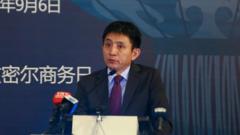China has made a surprising move by appointing a new trade envoy amid escalating tensions with the United States, which Chinese officials claim is significantly affecting the global economic landscape. Li Chenggang, the new envoy, is a former World Trade Organization (WTO) ambassador and previously served as an assistant commerce minister. He replaces Wang Shouwen, a veteran trade negotiator, signaling a potential shift in strategy as the trade war with the US intensifies.
Recently imposed tariffs by the US, initiated by President Trump, have raised concerns within China's already decelerating economy. A recent report revealed that China's GDP recorded a growth of 5.4% in the first quarter, surpassing analysts' predictions, but was acknowledged to reflect data before recent tariff escalations took effect. As China braces for the economic repercussions, both nations have expressed a willingness to engage in negotiations, yet no actions have been taken toward resolution.
The appointment of Li, at 58 years old, comes as a crucial juncture in these trade discussions. Having a background with the United Nations and significant experience in commerce, experts view his installation as either a strategic maneuver to break the current deadlock or merely a routine administrative change. The urgency of these negotiations is underscored by the heightened levies from both nations, with the US imposing a staggering 145% on Chinese goods, prompting retaliatory measures from Beijing.
China's officials, including Sheng Laiyun of the National Bureau of Statistics, warned of adverse effects on foreign trade due to US tariffs but maintained confidence in the resilience of China's economy. State media has criticized the US actions as "economic bullying," with sentiments expressed that the US needs to reconsider its stance in global trade relations.
Despite these challenges, China's initial quarter GDP results showed a promising rise in retail sales and factory output. Analysts suggest that some of this growth may be temporary, driven by businesses rushing to adjust to the new tariffs, a phenomenon known as "front loading." However, ongoing issues such as a downturn in the property sector and concerns over domestic consumption remain pressing as China navigates escalating trade tensions.
Recently imposed tariffs by the US, initiated by President Trump, have raised concerns within China's already decelerating economy. A recent report revealed that China's GDP recorded a growth of 5.4% in the first quarter, surpassing analysts' predictions, but was acknowledged to reflect data before recent tariff escalations took effect. As China braces for the economic repercussions, both nations have expressed a willingness to engage in negotiations, yet no actions have been taken toward resolution.
The appointment of Li, at 58 years old, comes as a crucial juncture in these trade discussions. Having a background with the United Nations and significant experience in commerce, experts view his installation as either a strategic maneuver to break the current deadlock or merely a routine administrative change. The urgency of these negotiations is underscored by the heightened levies from both nations, with the US imposing a staggering 145% on Chinese goods, prompting retaliatory measures from Beijing.
China's officials, including Sheng Laiyun of the National Bureau of Statistics, warned of adverse effects on foreign trade due to US tariffs but maintained confidence in the resilience of China's economy. State media has criticized the US actions as "economic bullying," with sentiments expressed that the US needs to reconsider its stance in global trade relations.
Despite these challenges, China's initial quarter GDP results showed a promising rise in retail sales and factory output. Analysts suggest that some of this growth may be temporary, driven by businesses rushing to adjust to the new tariffs, a phenomenon known as "front loading." However, ongoing issues such as a downturn in the property sector and concerns over domestic consumption remain pressing as China navigates escalating trade tensions.




















